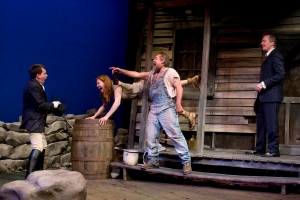Filed under: A Moon for the Misbegotten, Merrimack Repertory Theatre | Tags: A Moon for the Misbegotten, Bill Clarke, cast interview, Gordon Joseph Weiss, John Kooi, Kate Udall, Merrimack Repertory Theatre, Michael Canavan, MRT, three songs
INTERVIEW WITH MICHAEL CANAVAN

Michael Canavan and Kate Udall. Photo by Meghan Moore.
The multi-talented Michael Canavan makes his acting debut at MRT as Jim Tyrone in A Moon for the Misbegotten, but this is not the first time he has worked in Lowell. His first appearance at MRT was as the director of Three Songs in 2003. In addition to his work at MRT, Michael has had guest appearances on too many TV shows to mention, but a few of the more recent ones include Bones, Entourage, Criminal Minds, Big Love, CSI: Miami, and three different Star Trek series. Michael has also appeared in several films, including Hidalgo, and is a published playwright.
After finishing rehearsals for A Moon for the Misbegotten, Michael was gracious enough an answer a few questions about his work and his thoughts on the character of Jim Tyrone.
Last time you were at MRT, you directed the play Three Songs. Do you have any fond memories of the production, MRT or Lowell you would like to share?
My fondest memories from the Three Songs experience are mostly centered around the incredible support we got from the MRT administration and production staff. From Charles down, the levels of professionalism and commitment were absolutely first-rate. I remember very clearly how the designers (including Bill Clarke, who did the Moon set and is in my opinion one of the best Scenic Designers in the country) never came to me with complaints about the MRT team. That may sound like faint praise, but believe me, it is a nightmare for a director to have to pull his or her attention away from the rehearsal process to address production issues resulting from bad attitudes or habits. There is mindset here that failure is not an option, people are expected to do their best and be their best, and they do, happily. And that frees artists to perform at their highest level.
You have been active in both theatre and television. How would you compare working in theatre to TV/film work, and do you have a favorite?

John Kooi, Kate Udall, Gordon Joseph Weiss and Michael Canavan. Photo by Meghan Moore.
I don’t know a single actor who works in both live theatre and on-camera media who doesn’t vastly prefer the former. It has a lot to do with the more personal nature of the work, I believe. The rehearsal process is longer and more intimate, with opportunities for trial and error, and the actors’ relationship to the director lends itself to more give and take, and therefore less predictable discoveries and more variety. So much of the task for actors in film and TV is dominated by the technology – the camera’s view is very small and uncompromising – that the thing being filmed, the acting performance, frequently gets neglected. Very often, the first time you hear yourself and your scene partners speak the lines aloud is in front of the camera. Many actors who have never worked in the theatre (and some who have) think this makes the work more spontaneous and “real”, but in my experience, it usually results in less depth and texture, which is the opposite of reality.
How familiar were you with Eugene O’Neill and A Moon for the Misbegotten prior to the audition? Have you had the chance to act in any of his plays before? What are your thoughts on him as a writer?
This is my first time in an O’Neill play and I’ve never seen a live performance of A Moon for the Misbegotten. A long time ago, I saw part of the famous Colleen Dewhurst/Jason Robards film version, but I have no real memory of the play or those performances. That’s how I like it. I find having someone else’s performance banging around in my head burdensome. And it makes it easier to resist the foolish temptation to imitate the results of another actor’s rehearsal process.
I read Harold Bloom’s essay on O’Neill that is the forward to a recent edition of Long Day’s Journey into Night and took some comfort in his assertion that O’Neill’s art as a playwright owes most to Strindberg’s, since I had done Strindberg’s The Father. They share a churning, propulsive drive towards staging in their use of dialogue – the action is in the lines and carries through the pauses. And they both rather aggressively rely on symbolism in their language. It makes for occasional moments of clumsiness, certainly anyone expecting the poetry of, say, Williams will be disappointed, but there is a cumulative effect that develops amazing emotional power and psychological depth. The characters in Moon are sometimes most emotionally eloquent when they are least verbally articulate, and that makes for a major theatrical wallop.
What is the biggest challenge for an actor portraying your character, Jim Tyrone?
There are many, many challenges for the actor playing Jim Tyrone, most of the “warring hemispheres” variety. He loves the theatre and he lusts for death. He is vain and disheveled. He hates his father and follows in his footsteps anyway. He is described by other characters as both soft-spoken and a loudmouth. The list goes on. There is also a major technical challenge in the fact that he is drunk to varying degrees for the entire play. As anyone who has endured an evening with someone in that shape can attest, the condition does not lend itself to variety or subtlety. And it’s one of the toughest to portray convincingly. Oh, and did I mention he talks a lot? I guess I’m saying I was a fool to take this job.
Visit Merrimack Repertory Theatre Online
Leave a Comment so far
Leave a comment